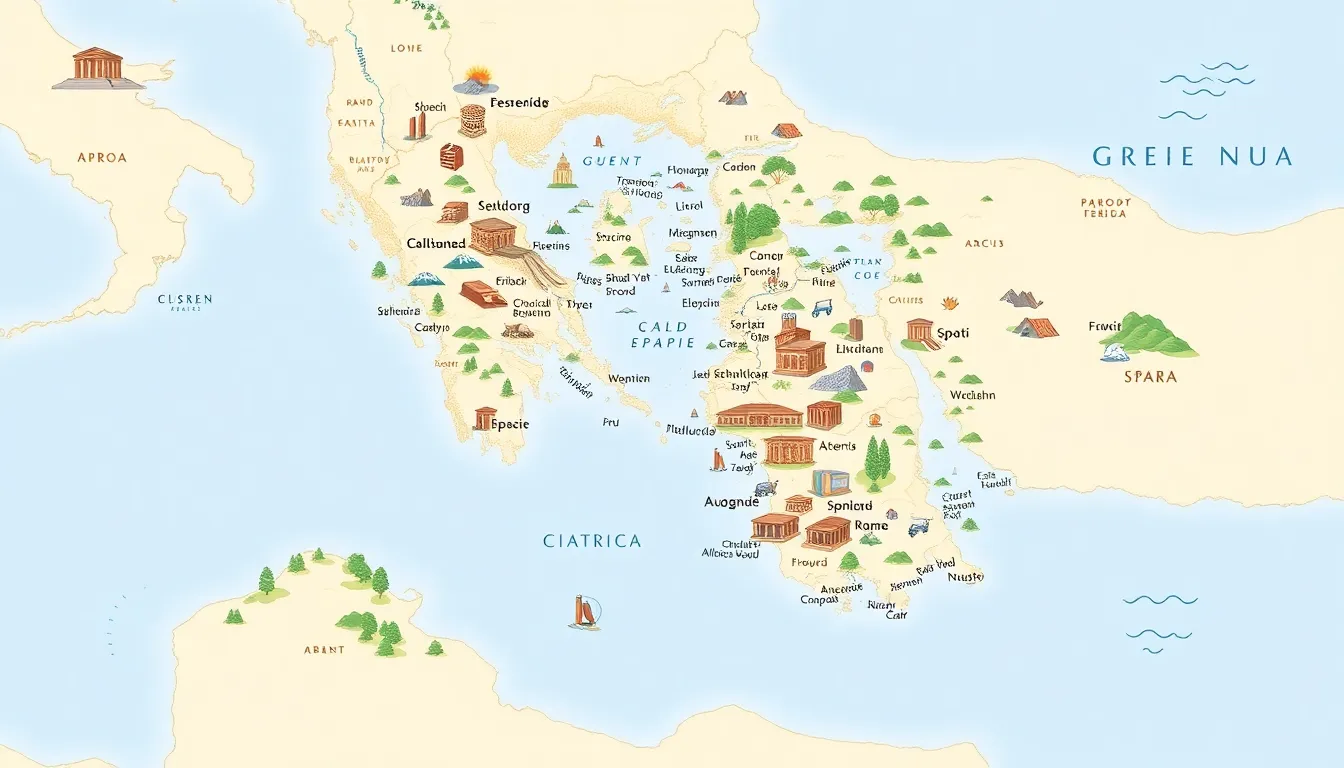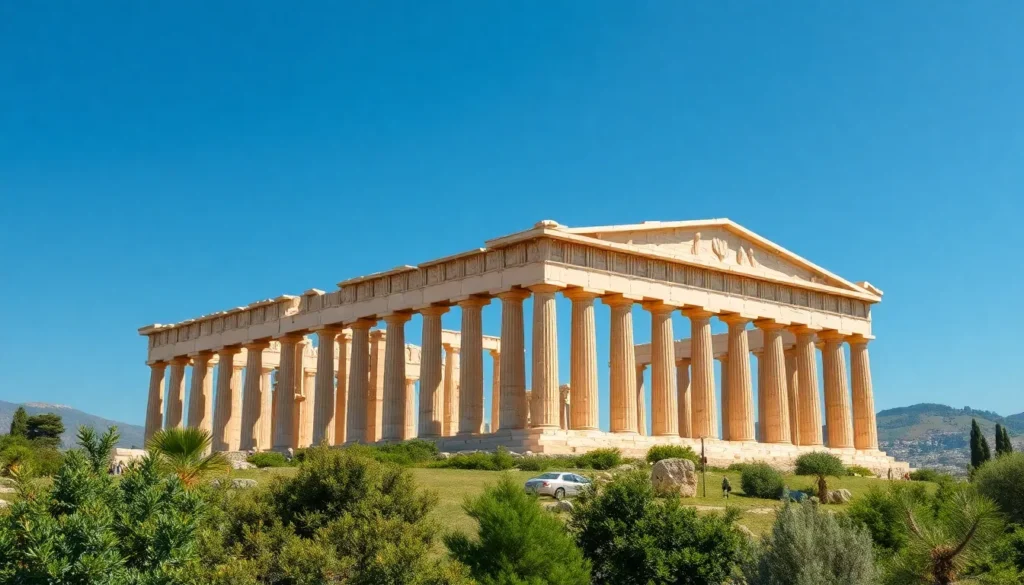The Greek Empire, a dazzling tapestry of culture, philosophy, and epic battles, has left an indelible mark on history. But just how long did this legendary empire reign? Spoiler alert: it wasn’t a flash in the pan. With its roots stretching back to the Bronze Age, the empire evolved through various phases, making it one of the most fascinating subjects in ancient history.
From the rise of city-states like Athens and Sparta to the conquests of Alexander the Great, the Greek Empire was a powerhouse of innovation and intellect. So grab your toga and settle in; this journey through time will reveal not just the duration of the empire but also the enduring legacy that still influences modern society. Who knew history could be this entertaining?
Overview of the Greek Empire
The Greek Empire fundamentally shaped Western civilization. Diverse city-states like Athens and Sparta emerged around the 8th century BCE. Each city-state featured unique governance, with Athens renowned for its democracy and Sparta recognized for its military prowess.
The Hellenistic period followed the conquests of Alexander the Great in the 4th century BCE. His empire expanded Greek culture across much of Europe and into Asia, essentially spreading the influence of Greek philosophy, art, and science.
During the height of the Greek Empire, its intellectual achievements flourished. Philosophers like Socrates, Plato, and Aristotle laid the foundation for Western thought. Dramatic works by playwrights such as Sophocles and Euripides contributed significantly to literature and theater.
Notably, the empire’s military strategies and tactics also transformed warfare. Innovations such as the phalanx formation reflected highly organized military structures.
The fall of the Greek city-states began in the early 2nd century BCE. Roman conquest gradually absorbed the Greek territories by the 146 BCE. While its political control diminished, the cultural legacy persisted, influencing art, architecture, and philosophy for centuries.
Greek architecture, with iconic structures like the Parthenon, exemplifies the empire’s lasting impact. Modern democratic systems continue to draw inspiration from ancient Greek practices. In every aspect, the Greek Empire’s contributions remain evident, demonstrating its enduring significance in shaping modern societies.
Timeline of the Greek Empire

The Greek Empire endured through multiple phases marked by cultural and political developments. It began in the Bronze Age, evolving significantly through the Classical Period and into the Hellenistic Era.
Early Greek Civilization
Early Greek civilization emerged around 3000 BCE, known for advancements in art, trade, and politics. The Minoan civilization, based on Crete, influenced cultural practices across the Aegean. Following this, the Mycenaean civilization from 1600 to 1100 BCE played a crucial role in shaping early Greek identity with a strong warrior culture. The collapse of these societies led to a period of decline, but by the 8th century BCE, the rise of city-states marked a revival. Political experimentation began here, with polises like Athens and Sparta establishing their unique governance systems.
The Classical Period
The Classical Period, spanning the 5th to 4th centuries BCE, defined Greece’s political and cultural legacy. Athens flourished as a center of democracy, arts, and philosophy. Significant figures such as Socrates, Plato, and Aristotle emerged, profoundly impacting Western thought. Sparta, contrastingly, became synonymous with militaristic rigor. Wars such as the Persian Wars united city-states against external threats, enhancing a shared Greek identity. However, the Peloponnesian War revealed internal divisions, ultimately leading to Athens’ defeat in 404 BCE and a significant shift in power dynamics among the city-states.
The Hellenistic Era
The Hellenistic Era followed the conquests of Alexander the Great in the 4th century BCE, expanding Greek culture throughout Asia and Egypt. His campaigns forged vast territories, blending Greek and local cultures, leading to significant advancements in science, philosophy, and art. Cities like Alexandria became prominent centers of learning and trade. The period witnessed the flourishing of new philosophical schools and increased emphasis on individualism. Despite the eventual division of Alexander’s empire, the enduring legacy of Hellenistic culture influenced subsequent Roman civilization and continues to resonate today.
Factors Influencing the Duration
Several factors influenced the duration of the Greek Empire. Each played a distinct role in shaping its rise and fall.
Political Structures
Political structures significantly impacted the stability of the Greek Empire. City-states like Athens fostered democracy, allowing citizens to participate in governance. These democratic ideals encouraged unity and civic engagement. Conversely, Sparta’s militaristic oligarchy created a powerful military state, prioritizing strength over individual freedoms. Internal conflicts among these city-states, particularly during the Peloponnesian War, weakened their collective power. As the political landscape shifted, the rise of autocratic rulers post-Alexander led to greater instability, reducing local governance by the 2nd century BCE.
Military Conflicts
Military conflicts played a pivotal role in the Greek Empire’s trajectory. The Persian Wars united city-states against a common foe, fostering a sense of shared identity. Successful victories in these conflicts bolstered confidence and territorial expansion. However, continuous warfare, including the devastating Peloponnesian War, drained resources and intensified rivalries. From 338 BCE, Philip II’s conquests and Alexander’s campaigns further expanded Greek influence but also spread the empire thin. By the mid-2nd century BCE, relentless military strife contributed to vulnerability and eventual conquest by Roman forces.
Cultural Influence
Cultural influence marked a cornerstone of the Greek Empire’s legacy. The dissemination of philosophy, art, and science occurred throughout the Hellenistic period. This cultural blending facilitated advancements and exchanged ideas among diverse populations. Iconic figures like Socrates, Plato, and Aristotle shaped Western thought, embedding their philosophies in educational systems. Additionally, architecture, exemplified by structures like the Parthenon, showcased Greek artistry. Despite the decline of political power, this rich cultural heritage endured, continuing to shape societies long after the empire’s fall.
Legacy of the Greek Empire
The Greek Empire’s legacy remains vital in various domains, influencing politics, philosophy, and art. Philosophy flourished with notable figures such as Socrates, Plato, and Aristotle, whose works laid foundations for Western thought. Art, characterized by realism and emotional expression, is evident in sculptures and pottery, shaping aesthetic standards across civilizations.
Greek contributions to political systems are profound. Concepts of democracy and civic participation emerged in city-states like Athens, inspiring modern democratic practices worldwide. Political thought, heavily influenced by Greek ideas, continues to inform contemporary governance structures.
Architecture, particularly the design and construction of temples, introduced classic elements that resonate in modern buildings. The Parthenon stands as a testament to Greek architectural innovation, symbolizing cultural achievement and civic pride. Its classical style inspired the Renaissance and remains significant in Western architecture.
The Hellenistic period expanded the exchange of cultural ideas, blending Greek traditions with Eastern influences. Cities like Alexandria became centers of learning and knowledge exchange, promoting advancements in science, mathematics, and literature. This cultural diffusion not only preserved Greek heritage but also enriched global intellectual traditions.
Despite the decline of political dominance, the Greek Empire’s cultural impact endured, permeating later civilizations such as Rome and influencing the Renaissance. Educational institutions and philosophical thought continue to reflect Greek principles, showcasing its lasting relevance in contemporary society.
The durability of the Greek Empire’s cultural essence highlights its significance across centuries, shaping diverse aspects of human experience. Societies worldwide still draw inspiration from Greek ideals, demonstrating the empire’s enduring legacy in the fabric of modern life.
The Greek Empire’s legacy remains a cornerstone of Western civilization. Its contributions to philosophy art and politics continue to resonate today. Even after the political decline and eventual conquest by Rome the cultural and intellectual achievements of the Greeks have shaped numerous aspects of modern life.
The ideals of democracy established in city-states like Athens still inspire contemporary governance. The artistic innovations and philosophical inquiries laid the groundwork for future generations. As a result the influence of the Greek Empire is not confined to history but is woven into the fabric of modern society.













